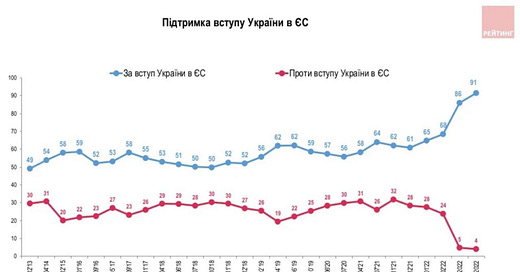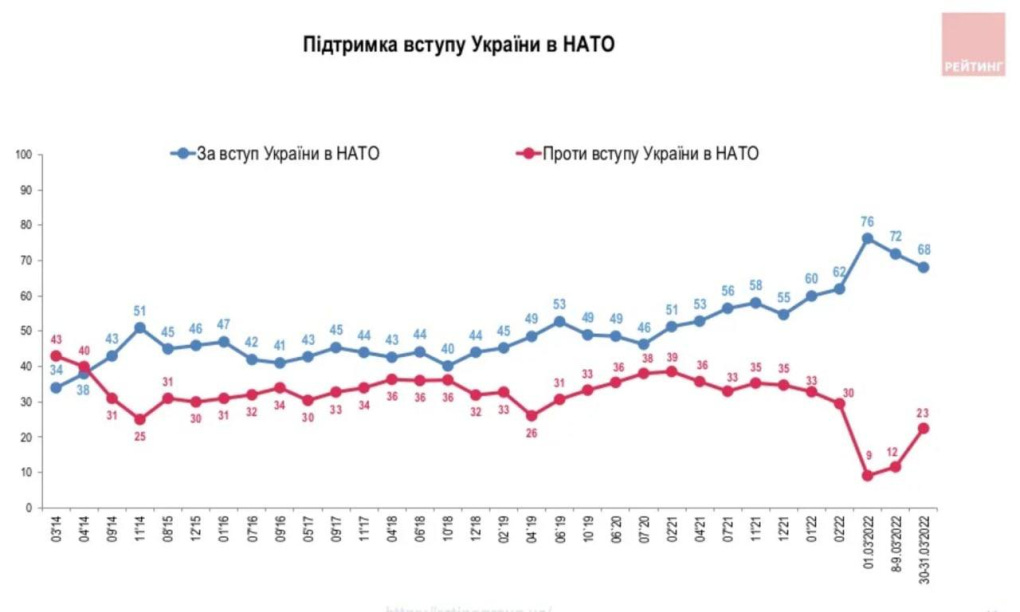The Ukrainian sociological poll agency ‘reiting’ released new figures, showing a dramatic increase in pro-EU sentiment and a moderate decline in NATO-optimism among Ukrainians.
This graph shows ‘support for Ukraine joining the EU’. The blue is ‘for’ and the red is ‘against’. For the entire post-maidan period, the proportion of pro-EU sentiments was between 50% and 60%, dipping in the middle of the rabidly-pro EU Poroshenko presidency, and increasing at the start of the Zelensky presidency, when it seemed like the promises of EU prosperity were coupled with a less aggressively nationalist rhetoric.
The proportion of those opposed to joining the EU composed 20-30% of the population. It’s worth noting that in post-maidan Ukrainian society, being against joining the EU is a position that puts you under considerable social pressure, with the possibility that you will be considered a pro-Russian traitor. If, as these polls say, 20-30% simply chose to say they don’t know about whether Ukraine should join the EU, it makes more sense to assume that among them are plenty of people who have their doubts about ‘EU-integration’, but prefer not to say them out loud, and have successfully ‘depoliticized’ themselves to avoid being accused of anything.
Anyway, it’s worth noting that until November 2021, the amount of both pro-EU and anti-EU sentiment was rising, to the detriment of those who said they didn’t know. I would put that down to a general malaise with ‘EU-integration’, with all its devastating economic effects, coupled with a doubling-down on pro-EU sentiments among its advocates. It’s worth noting that the anti-EU, ‘pro-Russian’ opposition platform for life party (now banned in Ukraine) had the highest rating in polls at the start of 2021, after which its party leadership and media was sanctioned by Zelensky.
But then around November 2021 the threat of war with Russia began, which clearly worked on the hand of those who say that EU-integration is necessary since the only other neighbor is hostile. And in any case, the neutralization of anti-EU forces like the opposition platform throughout 2021 meant that there was little in the war of a real organized political force to protest such a narrative, and their pro-Russian stance became harder and harder to maintain.
This graph shows ‘support for Ukraine joining NATO’. Blue is ‘for’, red is ‘against’.
Here, unlike EU-membership (which was propagandized by the Yanukovych government until 2013 as the solution to all evils in their attempt to blackmail Russia into giving Ukraine lower gas prices), at the beginning of 2014 there were more anti-NATO sentiments than pro-NATO. Naturally, this changed with the beginning of the war in Donbass in the middle of 2014, but the gap remained small, and, as with EU-membership, the gap became smallest (4%) in the middle of Poroshenko’s presidency, whose NATO fanaticism (even introducing the goal of joining NATO into the Ukrainian constitution, which has considerably complicated matters today) was coupled with anti-popular economic liberalization and nationalism.
But with NATO-membership, there is a curious pattern after the Russian invasion on February 24 2022. First, those against joining NATO dramatically drop, from 30% (22.2.22)-9% (1.3.22) over several days. Then, this figure rises again up to 23% after 30 days. Furthermore, while support for joining NATO rose from the 22nd of February to the 1st of March (62% to 76%), after that it began declining back to 68%.
What’s going on here? I’ll offer some of my suspicions, partly based on interaction with my Ukrainian family and friends, and conversations I had with people in Kyivan bomb-shelters in the first week of the war, the period when support for joining NATO rose moderately while the proportion of those against joining NATO dramatically decreased.
Basically, lots of people said something along the lines of ‘everyone has either betrayed us (Russia/Belarus, where 1 Ukrainian woman I talked to said that before the invasion she greatly respected Lukashenko, presumably for his social policies, but now she hates him worse than anyone) or doesn’t care about us (NATO, for not militarily intervening to help Ukraine). So this is why the amount of people who did not know what to say about NATO rose (if 76% on the 1st of March were pro-NATO and 9% were against, this means 15% didn’t know, while only 8% didn’t know on the 22nd of February).
Meanwhile, while in the Kyiv metro one woman kept on asking me what the latest news from telegram was about new sanctions was, since her phone was flat. Plenty of people love hearing such news, as it seems like Ukraine is being supported. Naturally, at the start especially plenty of people did think that there was some kind of chance of NATO militarily assisting Ukraine. And since anyone against NATO was now easily perceived as a Russian traitor, this camp drastically reduced.
However, over time, once it became clear that NATO would not accept Ukraine in its ranks, the amount of NATO believers began decreasing, and anti-NATO sentiment increasing.
About the former group, it is also worth noting that there are plenty on social media who share somewhat hysterical posts about how ‘resigning yourself to not joining NATO is just what Putler wants’, and so on. Faced with the death of their years-old political dream (joining NATO), many of them are doubling down in this belief in the hope of saving it.
Also, it isn’t exactly correct to say that ‘anti-NATO’ sentiment is increasing. Rather, there is simply an increase in the recognition that NATO won’t accept Ukraine, and hence a lack of belief in this perspective. But the idea that any non-NATO Ukraine will be ‘like Israel’ has been voiced by both Zelensky and the famous former interior minister Arsen Avakov. In Avakov’s words, ‘we will be neutral like Israel is’ - a militaristic society with US military-financial support, but not in NATO. According to Avakov, abandoning the NATO goal will allow Russia to militarily withdraw, which will give time for Ukraine to build up its army and defeat Russia and retake its lost territories in the future.
The two trends together
Is there a link between these two trends? Certainly - the popular idea (at least in the media and in certain statements from Ukrainian and Russian diplomats) is that Ukraine will receive EU membership in return for abandoning NATO ambitions. In this way, Ukrainian public opinion, hostile to the idea of abandoning NATO ambitions, would be mollified by the economic prosperity that joining the EU would supposedly bring. This idea is sometimes supported by statements of leaders in the EU - mostly by politicians in the eastern and central EU (such as the Czech Republic, Poland, and the Baltics).
In this sense, the increase in ‘support for joining the EU’ is less support for the EU in terms of a viable economic path for Ukraine, and more simply a tactic to end the war.
If you like what you see on my substack, consider donating to my patreon - https://www.patreon.com/eventsinukraine?fan_landing=true
I’m planning an interesting new project about economic and political processes in other countries of Eastern Europe near Ukraine such as Moldova and Bulgaria, partly since that’s where I’m living now, so any assistance is appreciated.




